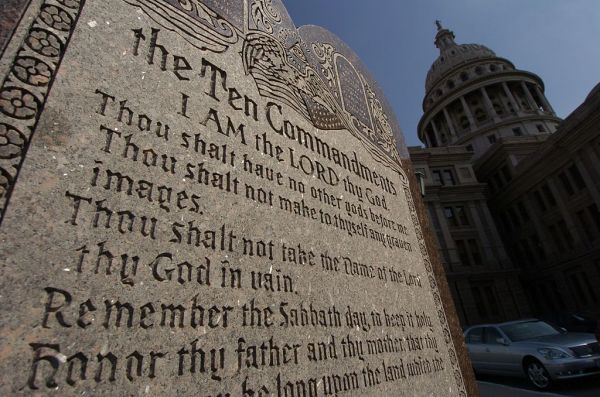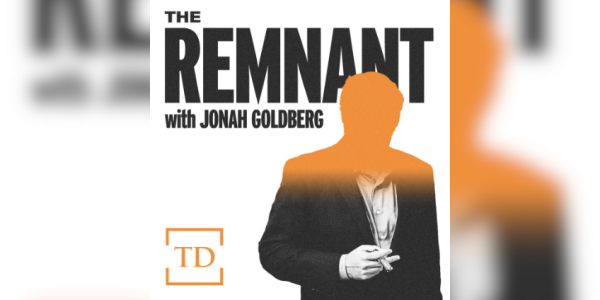An NPR political correspondent asked me this past week for thoughts on the opportunities and challenges House of Representatives Speaker Mike Johnson faces. She was knowledgeable about the attacks on him as well as the cheerleading for him. She wanted other perspectives and called me because I edited World magazine for 29 years, resigned two years ago, and could speak as a mostly conservative, definitely Christian journalist.
What might I offer? Maybe a step back from the immediate controversies over aid to Israel/Ukraine and domestic spending. Maybe some longer-term perspective about ends and means. I like the first question in the Westminster Shorter Catechism, a central Protestant document from the 1640s: “What is the chief end of man?” The answer is “to glorify God, and to enjoy him forever.” That’s also a good question to ask about nations: “What is America’s chief end?”
Conservative Christians have been and are divided on that. Some believe that to glorify God we should attempt to make America a modern version of ancient Israel, a holiness theme park with (officially) zero tolerance for wrongdoing. They say we should follow the laws laid out from Exodus to Deuteronomy and have severe penalties for disobedience. Theologian Rousas Rushdoony made the comprehensive argument for this in The Institutes of Biblical Law (1973), and a half-century later politicians like Lauren Boebert offer slimmed versions.
I’ll offer two reasons why those views are wrong. First, although some Christians and Jews turn the Old Testament—the Hebrew Scriptures—into a series of exemplary stories, it’s more a history of defeat. The book of Genesis shows how Adam and Eve lived in an ideal environment but still messed up. Later, Abraham, Isaac, and Jacob all had family dysfunctions. They had descendants who fell into slavery in Egypt but eventually grew into a nation that returned to a promised land with some unique advantages.
The Bible tells us the ancient Israelites had laws emanating from God Himself. They had a tabernacle and then a temple constructed according to God’s own instructions. They had priests and prophets. They had the opportunity to become a model nation in a Holy Land. It would not be a new Eden, for sin would still burden man, the earth would still yield its produce reluctantly, and earthly life would still end in death. But it could be a semi-Eden, a land flowing with milk and honey.
It didn’t work. This Holy Land was supposed to be spotless, a serious equivalent of Disneyland in which not a single candy wrapper stays on the ground for more than a few minutes. But prophets such as Jeremiah communicated God’s judgment: “You defiled my land and made my heritage an abomination.”
Israelites bowed to kings who said they would beat up other kings. They worshiped false gods made in their own image, who smiled at child sacrifice. They weren’t worse than other ANE (Ancient Near East) nations, but they weren’t much better. If with all their advantages the Israelites could not produce a holy land, what does that say about what believers can do in America?
Second, let’s remember biblical teaching about the difference between living on holy ground and living elsewhere. Israelites in the ANE outside of Israel had a different agenda than those inside. The prophet Jeremiah instructed Israelites exiled in Babylon to be happy citizens there: “Build houses and live in them; plant gardens and eat their produce. … Seek the welfare of the city where I have sent you into exile, and pray to the LORD on its behalf, because in its welfare you will find your welfare.”
What? Babylon was hostile to God and God’s people. Babylonians were known for viciousness the last king of Judah, Zedekiah, saw firsthand while he could still see: The Bible says, “They slaughtered the sons of Zedekiah before his eyes, and put out the eyes of Zedekiah and bound him in chains and took him to Babylon.” Israelites in exile had to walk by idols every day without getting irate.
Others had it even worse. The Book of Daniel shows how he hung out with enchanters, sorcerers, and other Babylonian courtiers, the scum—to channel Nikki Haley—specifically banned in Israel. In Persia, cupbearer Nehemiah was the last defense against attempts to poison an idol-worshiping king. Mordecai in the Book of Esther broke up an assassination plot against a Persian king who not only walked through the historical equivalent of a Miss Universe locker room, but “grabbed” a contestant each night, month after month.
The New Testament continues the saga of believers in God living amid those who not only lived differently but mocked their belief, and worse. The apostle Paul, like some Christians in China now, was imprisoned, beaten, and left for dead. But the Book of Acts shows how Paul “reasoned in the synagogue” and quoted Greek poetry when speaking with politeness but determination to political intellectuals.
Whenever those professing faith in Christ stop trying to persuade, and start displaying faith in power, the results are poor. The English Revolution had its Cromwellian phase in the 1650s, and the result was counter-revolution. Russians under the czars and new Czar Vladmimir Putin have attacked others with the blessing of unorthodox Orthodox patriarchs who retain their privileges by privileging power over peace.
Happily, life has been different in an America pledged to pursue a different end: “that all men are created equal, that they are endowed by their Creator with certain unalienable Rights, that among these are Life, Liberty, and the pursuit of Happiness.”
Abraham Lincoln summarized our chief political end this way: America was “conceived in Liberty and dedicated to the proposition that all men are created equal.” Immigrants knew they were arriving in America when they saw the Statue of Liberty. Schoolchildren for generations sang “My country, ‘tis of thee, sweet land of liberty.” Martin Luther King Jr. recited that verse near the end of his “I Have a Dream” speech.
Ancient Israel was supposed to be a holiness theme park, but America is a liberty theme park. Given our world-leading diversity of race, ethnicity, and belief, differences are not surprising. Nor is it surprising that presidential elections from 1876 to the present have usually been close, as two major parties jockey for position and flip allegiances. The only thing truly different now is that, for the first time since 1860, almost half of America refuses to abide by an election result.
Liberty is now under assault from both the cancel-culture left and the cancel-elections right. The far left and the far right each look to models abroad: The far left still praises Cuba, the far right loves Hungary. Such impatience with American muddling through means that the question Lincoln addressed to those gathered at Gettysburg in 1863 is again on the table eight score years later: He spoke of an America “engaged in a great civil war, testing whether that nation, or any nation so conceived and so dedicated, can long endure.”
With great loss of life America survived the test in Lincoln’s time and the 20th century tests of war, depression, and civil unrest. Thankfully, we now have only a war of words, but the election of 2024 could begin to change that—if it’s perceived by either side as a Flight 93 election, to use the term Michael Anton popularized in 2016. Millions of Americans apparently believe hijackers are in control and brave people have to storm the cockpit, risking a crash like the fatal one that occurred in a Pennsylvania field on September 11, 2001.
Donald Trump, of course, tells his adherents that the next election “will decide whether power in America belongs to THEM, forever—or whether it belongs to YOU, the men and women who make this country run.” Trumpists like David Horowitz and Eric Metaxas talk as if it’s two outs in the last of the ninth inning, rather than midway through a seventh inning in which we can still stretch and sing “God Bless America” and “Take Me Out to the Ballgame.”
Two recent Horowitz books—Dark Agenda: The War to Destroy Christian America and Final Battle: The Next Election Could Be the Last—both play to ninth-inning thinking. Eric Metaxas tweeted on Thursday, “More and more I see our corrupt unfit ‘leaders’ like Biden and [Homeland Security Secretary] Mayorkas et al. the way the French Revolutionaries saw Louis XVI and Marie Antoinette.” He said Biden and others must go but “we don’t need to behead them.” Whew!
It’s important to stop talking that way. The NPR correspondent rightly wanted to see what’s behind the day’s political headlines. Here’s my sense: Many secularists and religious folks alike are conflating ancient Israel’s chief end and America’s chief end. My favorite name for a think tank remains Minnesota’s Center of the American Experiment. We’re still living in an experiment, and I don’t believe it has run its course.
The experience of ancient Israel and many nations since then shows we should not look for salvation by a tall King Saul. Some Christian conservatives today complain that our laws allow activities we don’t like, but those laws also protect religious liberty. Our current situation, especially viewed in the light of three millennia, should not make us desperate enough to follow an insane sheriff just because he brandishes a six-shooter.
I pray that Mike Johnson is not the radical Christian nationalist some in the press have made him out to be. I hope he agrees with what I’m suggesting about America’s chief end. I hope he sees that a godly leader’s chief end is to remind us to rely on God.








Please note that we at The Dispatch hold ourselves, our work, and our commenters to a higher standard than other places on the internet. We welcome comments that foster genuine debate or discussion—including comments critical of us or our work—but responses that include ad hominem attacks on fellow Dispatch members or are intended to stoke fear and anger may be moderated.
You are currently using a limited time guest pass and do not have access to commenting. Consider subscribing to join the conversation.
With your membership, you only have the ability to comment on The Morning Dispatch articles. Consider upgrading to join the conversation everywhere.